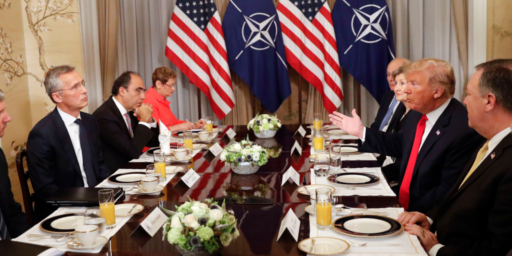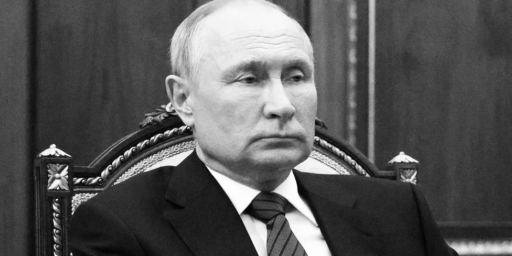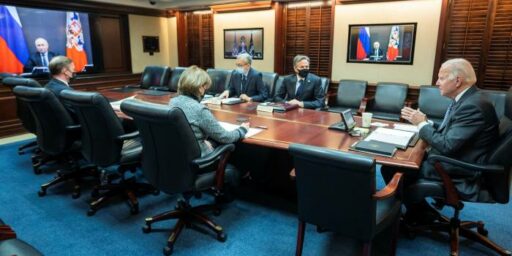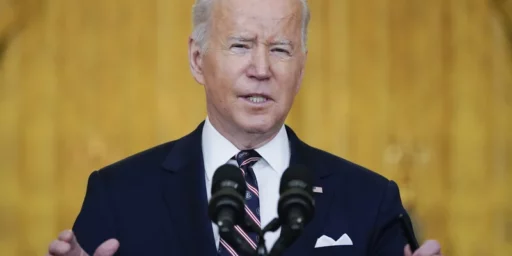So Many Opinions, So Little Time (Ukraine Edition)
The Christian Science Monitor sees a primary role for German leadership in resolving the crisis in Ukraine:
“The law of the jungle is placed against the strength of the law, unilateral geopolitical concerns against understanding and cooperation,” she [Ed.: i.e. German Chancellor Angela Merkel] said. “The clock cannot be turned back. Conflicts of interest in the middle of Europe in the 21st century can be successfully overcome only if we don’t fall back on the patterns of the 19th and 20th centuries.”
Merkel has given Putin ample time to prove his claims that ethnic Russians in Crimea are in danger. But he did not permit international inspectors to enter. She also distanced Germany from Washington’s moves to place warships and fighter jets closer to Ukraine, thus affirming German pacifism.
But her patience ran out just days before a March 16 referendum in Crimea that could pave the way for the peninsula on the Black Sea to be annexed by Russia – in violation of international law about secession.
“What we are witnessing now is oppressive, and I fear we need to be prepared for the long haul in solving this conflict,” she said.
If the majority of Russian-speakers in Crimea vote to secede, the EU plans to impose travel bans and asset freezes on Russian leaders involved with violating Ukraine’s sovereignty and territory. Then full economic sanctions will follow.
For its behavior, Russia must feel “massive damage,” Merkel said. And next week, the EU and Ukraine will go ahead and sign the political accord that started the crisis last year when Ukraine’s then-president rejected it, bringing mass protests that led to his ouster.
Her speech signals a new Germany, one ready to take on global leadership as the United States seeks a reduced role during a period of retrenchment. But more important, today’s Germany understands the necessity for nations to make progress. After all, in just seven decades, Germany has “turned a past blighted by war and dominance into a present marked by peace and cooperation,” in the words of its president, Joachim Gauck.
Fareed Zakaria points out the role that Germany played in fomenting the crisis in the first place:
Ukraine is the most important post-Soviet country that Russia seeks to dominate politically. If Europe wanted to help Ukraine move west, it should have planned a bold, generous and swift strategy of attraction. Instead, the European Union conducted lengthy, meandering negotiations with Kiev, eventually offering it an association agreement mostly filled with demands that the country make massive economic and political reforms before getting much in the way of access, trade or aid with Europe.
and calls on President Obama to “lead from the front”:
I have generally been wary of the calls for U.S. intervention in any and every conflict around the world. But this is different. The crisis in Ukraine is the most significant geopolitical problem since the Cold War. Unlike many of the tragic ethnic and civil wars that have bubbled up over the past three decades, this one involves a great global power, Russia, and thus can and will have far-reaching consequences. And it involves a great global principle: whether national boundaries can be changed by brute force. If it becomes acceptable to do so, what will happen in Asia, where there are dozens of contested boundaries — and several great powers that want to remake them?
Obama must rally the world, push the Europeans and negotiate with the Russians. In this crisis, the United States truly is the indispensable nation.
Germany has decided to reduce its dependence on nuclear energy and, recently, tried to reduce its reliance on coal, on which it relies for most of its energy needs. Much of Germany’s oil and gas comes from Russia. It will be interesting to see how the Germans plan to power their factories while decreasing their use of nuclear energy, reducing their use of coal, and inflicting “massive damage” on Russia simultaneously.
Meanwhile, Charles Krauthammer urges the president to re-assert the “tripwire” strategy used against North Korea:
● Send the chairman of the Joint Chiefs to the Baltics to arrange joint maneuvers.
● Same for the four NATO countries bordering Ukraine — Poland, Slovakia, Hungary and Romania.
● Urgently revive the original missile-defense agreements concluded with Poland and the Czech Republic before Obama canceled them unilaterally to appease Russia. (But first make sure that the respective governments are willing to sign on again after Obama left them hanging five years ago.)
[…]
● Extend the Black Sea maneuvers in which the USS Truxtun is currently engaged with Romania and Bulgaria. These were previously scheduled. Order immediate — and continual — follow-ons.
● Declare that any further Russian military incursion beyond Crimea will lead to a rapid and favorable response from NATO to any request from Kiev for weapons. These would be accompanied by significant numbers of NATO trainers and advisers.
or, in short, increase military tensions over the matter. What could possibly go wrong? I also surmise that Dr. Krauthammer is unfamiliar with the provisions of the Montreux Convention, which places entry into the Black Sea firmly in the hands of the Turks and limits the total tonnage of the vessels of any single country in the Black Sea. A major difference between North Korea and Russia is that Russia is the largest country in the world with the largest population of any European country. Although not the economic powerhouse that Germany, for example, is, it’s still a middle income country and, given its size, has vast resources. It also possesses a nuclear arsenal large enough to destroy the world.
Quite a few contrasting issues on the matter.






Time to dust off those Operation Barbarossa plans ;-).
See, the whole thing is just a clever plot by the Germans to be “invited” to send their tanks East.
Dr Krauthammer is offering advice that advocates a not-particularly-well-thought-out neo-con agenda that would only escalate tensions in the region?! I am SHOCKED!
And by “interesting” you must mean “entirely imaginary.,” given the big problems with Germany’s “Energiewende.”
Would Bundeskanzlerin Merkel really be foolish enough to endanger fossil fuels supplies from Russia? It’s not like they can just fire up overnight the nuclear reactors they’ve shut down.
Of course! We just need some advisers! Let’s say, 16,300…
Well, if they could capture the Russian oilfelds before winter sets in….
The Germans have had some experience here. Maybe the second time is the charm…
@mattbernius: Yeah. That’s Krauthammer. Beating the drums for war. Plus throwing in any gratuitous slap he can at Obama.
@stonetools: Dunno, it really didn’t go all that well the first time and the Bundeswehr ain’t what it used to be…
You’re giving Krsuthammer bandwidth, why?
@Mikey:
Ah, but if they could start in May instead of June. After all, there is no need to waste time and energy supressing those pesky Balkans states..
OK this is all fantasy, but it makes for a great RISK scenario.
@stonetools:
Also NATO would presumably actually go after the oil fields instead of getting bogged down in an entirely symbolic battle over the strategically useless city of Putinville.
@Mikey:
RISK scenarios aside, I would figure it’d be an EU-wide decision if they were going to take action against Russia. Germany has the strongest economy, but the rest of the EU has been bogging it down as of late.
And with Venezuela in chaos and our production capacity (or ability to deliver) nowhere close to its needs, I’m wondering what the contingency plan is if Germany shoots the economic potato cannon.
If those lousy Australians capture Indonesia and New Guinea, it’s all over.
@Tillman:
On the otherhand, there’s some arguing that the US natural gas boom is going to leave to a severe economic crunch in the next couple of decades for countries, like Russia, where the economy is dependent on oil exports, and that this in fact is the cause of Russia’s growing beligerence. It’s doing it now because the momment to do so is already starting to slip away.
They always trot out the same talking heads for us, don’t they? As if they are experts on everything! I guess it’s cheaper to use salaried employees.
Here’s an obscure but remarkable interview from mid Feb that includes one of our nerdier ambassadors to the Ukraine from the early aughts, Herbst. I suspect he’s worth listening to because at one point he predicts as confidently as if he were reading a clock that if Yanukovych asks his police to get any more violent they would either switch sides or abandon their posts en masse.
That’s exactly what they did. Hmmmm……
All three of these folks appear to know what they are talking about. That is to say, they probably have forgotten more about the Ukraine than Charles Krauthammer ever knew.
http://www.youtube.com/watch?v=X-ksC6Sq-ek
@Stormy Dragon: Even worse for their oil exports would be if meaningful sanctions against the Iranian oil. Russia is a “superpower” in military alone. Their economy is slowing, the oligarchs have embezzled instead of developing the country in any meaningful way. If oil and gas prices drop due to a decrease in demand or an increase in production, I won’t be shocked if what happened in Kiev happens in Moscow.